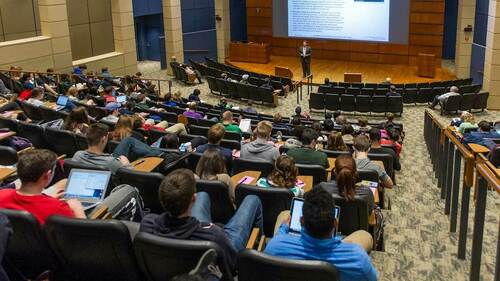
From Siri and Alexa to driverless cars and robots, artificial intelligence and the many devices AI inhabits are well integrated into our everyday lives. But as the technology advances, ethical and moral questions arise.
Ten Years Hence, an annual lecture series sponsored by the University of Notre Dame’s Mendoza College of Business, will explore advances in AI and the potential implications for the human community. The series “Automation, Robotics and Artificial Intelligence: The Decade Ahead” takes place on select Fridays from 10:40 a.m. to 12:10 p.m. in Mendoza’s Jordan Auditorium.
The Ten Years Hence speaker series explores issues, ideas and trends likely to affect business and society over the next decade. Students, faculty and the community use guest speaker comments as a springboard for structured speculation about emerging issues and the next decade.
The talks are free and open to the public.
The full schedule is as follows:
Jan. 26: Jim Schmiedeler, professor of aerospace and mechanical engineering,
University of Notre Dame. Schmiedeler — whose research focuses on robotics, human biomechanics and the intersection of the two — will present “Ubiquitous Robots? Challenges and Opportunities.”
Feb. 23: Nitesh Chawla, Frank M. Freimann Professor of Computer Science and Engineering, University of Notre Dame. Chawla’s research focuses on data science, machine learning and network science. He is especially interested in driving technological innovations to augment human intelligence toward the goal of benefiting the common good.
March 2: Otto Berkes, chief technology officer, CA Technologies. Berkes is responsible for technical leadership and innovation, further developing the company’s technical community, and aligning its software strategy, architecture and partner relationships to deliver customer value.
March 23: Steve Shute, executive vice president and chief business officer, SAP Americas and Asia Pacific Japan. Shute will discuss “Enabling the Intelligent Enterprise with the Next Generation of Technologies,” which explores topics such as machine learning, immersive experience and Blockchain.
April 13: Hendrik F. Hamann, senior manager and distinguished research staff member, IBM T.J. Watson Research Center. Hamann’s current research interests include sensor networks, sensor-based physical modeling, machine learning, artificial intelligence and big data technologies. An IBM master inventor, he holds more than 110 patents and 100-plus pending patent applications.
April 20: Gill Bejerano, associate professor of developmental biology, computer science and pediatrics, Bejerano Lab, Stanford University. Bejerano operates the Bejerano Lab, which studies genome function in humans and related species.
April 27: Charles Calderaro III, senior vice president, global manufacturing, BioMarin Pharmaceutical Inc. Calderaro is responsible for the strategic oversight and leadership of a diverse international manufacturing network, which utilizes small molecule, biotechnology and gene therapy technologies to deliver clinical and commercial products to patients.
Ten Years Hence, sponsored by the O’Brien-Smith Leadership Program, is made possible by a generous endowment from alumnus William H. O’Brien and his wife, Dee. The program is named after their respective parents. The endowment provides an opportunity for students and faculty to interact with distinguished leaders from business, government and nonprofit sectors.
For more information, visit the Ten Years Hence website.
Contact: Jean Meade, Mendoza College of Business project administrator, 574-631-3277, jean.meade@nd.edu